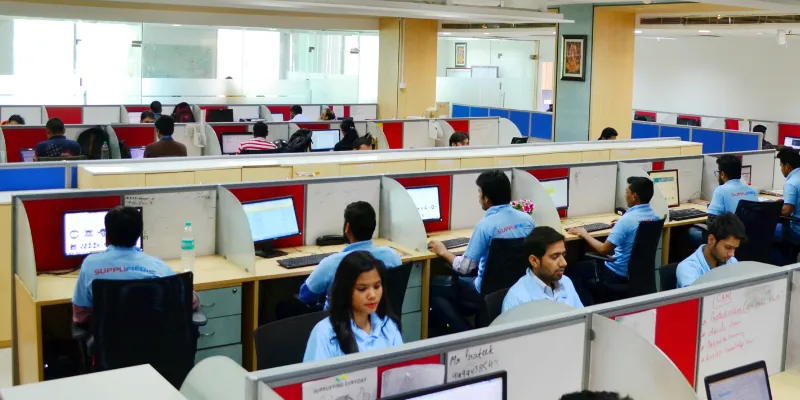Two second generation entrepreneurs take on the $150B construction market online
Two dynamic individuals, both of whom had taken on the real estate industry when it was undergoing absolute turmoil in 2009, happened to meet for the first time at a workshop at ISB, Hyderabad in 2011.They were given the task of establishing the youth wing of CREDAI, the industry body in North India. The knowledgeable duo had learnt the ropes of the traditional construction business, but was brimming with ideas to give it a futuristic twang. As they put their heads together to chart the trajectory for the real estate industry, Mohit Goel had his Eureka moment – noting the need for all developers to develop a mechanism for collective purchasing, which also struck a chord with his creative-other half Nalin Saluja.
Although the idea didn’t take off then, the seeds were sown. Four years later, in September 2015, it blossomed into Supplified.

The duo
Both Mohit and Nalin come from business families, with their fathers being their life mentors. Mohit, 26, was born in Palwal, a modest town south of Faridabad, and holds a BCom Hons from DU. His father made it big in life starting with a mere Rs 500 in his pocket, and ended up establishing one of the largest real-estate empires in north India. “And every new entrepreneurship lesson was brought to the dinner table,” Mohit says.
After his first job at Grant Thorton as a consultant, Mohit joined his father, and successfully got the company out of the real estate turmoil in 2009. On the other hand, ex-Goldman and Sachs employee, 29-year-old Nalin hails from Faridabad. He moved back to India in 2010 and started working with the real estate wing of his family business, just like Mohit, which gave him six years of hands-on construction experience.
The gameplan
According to a 2013 PwC report, the construction industry contributed eight percent to India’s GDP. Supplified.com is taking this $150-billion market of construction materials and home décor appliances and fittings online. It is a B2B-focussed online marketplace for construction materials. The value creation at its heart is to make the buying experience of construction materials and machinery easy, convenient and efficient- by perfecting their JIT inventory model for an industry where the standard inventory period is about 3 months.
As a B2B offering, there are two marketplaces the company wants to conjure. Already in effect is its e-commerce wing. Another line extension will be Supplified's foray into sharing economy, which was the brainchild of Mohit when he realised that there is a massive opportunity to optimise the system, not just for his own company but also for the whole industry. The sharing economy of the developer and contractor community, set to be live in a few months, will have large inventory stocks for materials and equipment that can be shared and rented peer to peer.
“Our main aim is to bringing people from offline to online,” says Nalin. The team is headquartered in New Delhi. “It is the biggest market to start with, considering 20-30percent of India’s construction activity goes on in Delhi-NCR,” he adds.

“We are targeting the full range of construction companies- right from small and medium enterprises involved in construction work and facility management, to the big developer and builder community. For the former, the team in charge of purchases may not be the most tech-savvy, so the UI/UX was built keeping in mind that it has to be as easy and contractor friendly as possible,” explains Nalin.
To on-board the same section that is set in their traditional ways of buying, Supplified has a 20-people business development team, which goes around meeting small and medium contractors.
Here’s how they’re doing the above, exactly.
If a large company were to buy in bulk, in all probability, they are in direct contact with the manufacturing company and they get very attractive bulk discounts. Moreover, credit facilities available to the buyers in the offline physical market – especially when it comes to cement and steel, always bought in large consignments – is a big incentive for them to continue buying the traditional way. How is Supplified competing with that?
“By aggregating directly from manufacturer brands, we have put in a lot of effort in achieving the same price discovery. And the manufacturers associated with us are providing credit to our big-ticket buyers. Granted, the smaller contractors who get credit in the offline physical market also get it on low ticket value items, but, according to our estimates, this only constitutes a fifth of the market. We have been able to tap the remaining 80 percent,”Nalin says.
The startup's sales team nudges reluctant buyers who opt only for high-ticket items into exploring other purchases too.
Bootstrapped with the duo's collective funds of around $1 million, Supplified currently has 654 registered clients and has clocked sales of Rs 56 lakh in February, growing at the rate of 110percent every month. “We plan to expand to Chandigarh, Ludhiana and other Tier II and III cities by the end of this year. Features such as peer-to-peer rental of machinery and equipment, credit ratings mechanism, are also in the pipeline.” The team is now looking to raise funding this year.
Competing with them in their geographic zone, is Buildzar- a slightly older company clocking Rs. 11 crores in revenues monthly. Many other players have sprung up, albeit in their respective geographic zones –like Msupply, that raised its Series-A, and Buildkar, which raised a seed round last month, in Bengaluru. Econstructionmart is the most seasoned of them all, operating all over Gujarat, Rajasthan and select cities in Uttar Pradesh.







